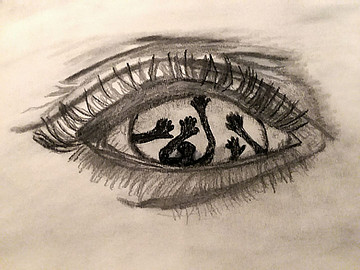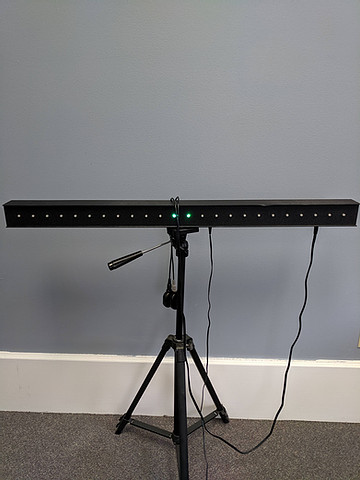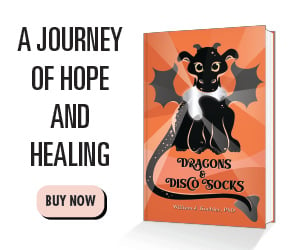Let me start by saying I am far from being an expert on #EMDR. In fact, I was only trained a year ago. During this year however, I have seen approximately 2 dozen clients who have had at least one EMDR session with me. Many have had more, but this process isn’t for everyone. My youngest client was 3 years old, and my oldest is 62. Obviously, my sessions with a 62-year-old are vastly different than with the 3-year-old – I’ll let you guess which one ended each session with yoga poses.

I’ve also continued working with my own EMDR therapist during this time. She is the one who should be writing this post because she has been doing this type of therapy for years. So, I also asked for her thoughts before posting. I don’t think she saw me take this picture (below), but it’s her ‘bilateral stimulation’ machine. In my memoir I refer to it as the green-eyed panther, but we’ll get to this later. For now, since there is so much mystery surrounding EMDR, and it is receiving more celebrity attention (click here for an article about pop singer Mel B.’s (a.k.a. Scary Spice) experience or here for comedian Adam Cayton Holland’s testimony about EMDR being the ‘best drug’ he has ever had), I thought I’d share the 5 most common questions I get asked about this mysterious treatment.
5 – Will EMDR Help Me Forget?
Many people ask this question. Last week I met with a new client who was referred to me specifically for EMDR. The hospital referring them did not explain what it was, just told them they needed it. To their credit, they came.
“I just don’t want to remember what happened to me. I can’t even sleep in my own home anymore. When I’m there, I’m overwhelmed by [the memories of] what happened. When I remember, I drink until I forget.”
“Will EMDR help me forget?” The answer is ‘no, but…’ EMDR won’t make you forget what happened, but it will help you remember dispassionately. The D in EMDR stands for Desensitization. EMDR will help you be desensitized to your traumatic experiences. Instead of your body reliving them when you are reminded of them (or triggered), you can think of them in a more detached way. It’s like rewatching a scene in a movie instead of reliving the event repeatedly – the terrible event had a beginning, a middle, and an end. Instead of a tragic event(s) BEING your life story, it can now be just another part of your past.
4 – Will EMDR Make Me Remember?
Many people believe EMDR will somehow magically unlock a door where a host of forgotten horrors live. They are concerned they will suddenly ‘remember’ being abused for years when they had suppressed it before. Does this happen? Again, the answer is ‘no, but…’
Memory is a completely bizarre phenomenon. The same thing can happen to two people, and, when asked, they will remember it differently each time. In fact, ask the same person to tell you about an event, and they will remember it differently each time as well.
We’ve probably all experienced this phenomenon to some degree. Ask a friend who spent a fun day with you last year to tell the story and I can almost guarantee you will find differences in the way you remembered the day. Or, if you keep a journal, like me, go back and read about an event you wrote about shortly after it happened and compare it to your memory of it now. No doubt it will be different.
This happens to everyone who undergoes EMDR treatment because it happens to EVERYONE regardless. Research suggests our memory of an event is changed every time we recall it. I’ve spent countless hours lost in a sea of academic journal articles studying this. I won’t bore you with everything I’ve found, but click here to read a short post on a Psychology Today blog which summarizes the concept well.
When people begin EMDR though, this phenomenon generally makes them anxious.
“What if I’m just making all of this up?” I said. “My sister doesn’t even think our babysitter’s name was Alice let alone remember her being inappropriate. She went through the same experiences as I did, and she’s fine. I must be crazy.”
A bigger fear skeptics have is something called False Memory Syndrome – the idea that a therapist is taking advantage of their client’s vulnerable state and implanting events in a person’s mind. We will get into this more in the 3rd most popular question I’m asked about EMDR. For now, let me assure you each and every person going through trauma-resolution treatment experiences the doubt about the accuracy of their recall of events. There are several reasons for this, and one of them is actually utilized by EMDR to help heal people from their past trauma.

Let me explain what I mean: The R in EMDR represents the term Reprocessing. When difficult things happen, the experiences often leave us with a distorted belief about ourselves and our place in the world. A person whose apartment was robbed may then believe they aren’t able to keep themselves safe and the world is full of danger. Someone who lived through a car accident may believe they are a terrible driver and all other drivers are erratic. These thoughts about the experience produce feelings (like fear, shame, doubt, anger, etc.) which then change our behavior – staying home and locking all doors and windows securely, avoiding driving, or rerouting a commute to avoid the place the accident occurred.
When you reprocess the memory, you develop a different, more accurate understanding of the event – this was a terrible thing, but it is over and I survived, or, I had no control over the weather, but that doesn’t mean I’m a bad driver and everyone else is careless. With a new belief about the event comes new feelings, with new feelings, new behaviors. It’s more involved than this, but you get the idea.
Well, this is a little over a 4-minute read for you all and I’ve only covered the 5th and 4th most common question I am asked about EMDR. Next time I’ll discuss more common questions. Thanks for reading!
Please reach out with your thoughts, questions or experiences with EMDR. I’d love to hear what your journey is like! You can reach me at www.atraumainformedlife.com







